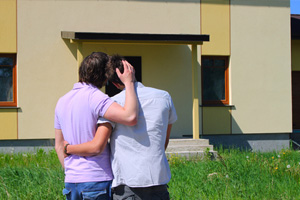GPs are becoming more aware of same-sex families attending their practices as part of a growing social change, says the coauthor of an ongoing study into same-sex families in Australia, Associate Professor Ruth McNair.
Professor McNair, of the department of general practice at the University of Melbourne, told MJA InSight that the study showed that many GPs had not realised they were seeing same-sex families.
“It’s not so much been about homophobia”, she said.
An update on the Australian Study of Child Health in Same-Sex Families (ACHESS) national research project is published today by the MJA. (1)
ACHESS is a work in progress. A preliminary report on the study’s background research, design and methodology was published last year. (2)
In the current MJA article, the authors set out to describe what makes a same-sex parented family, pointing out that many combinations of gender, conception method and parental status exist, and that doctors need education to recognise, respect and treat those different family groups.
Professor McNair said same-sex families were becoming more common. “It’s a growing social change, particularly among gay men who are coming to understand that having a family is okay, and they can access surrogacy now.”
New Zealand’s decision last week to legalise same-sex marriage would benefit the health of that country’s same-sex parents and their children, Professor McNair told MJA InSight. (3)
“Studies from the US have compared states with same-sex marriage laws with those without them and they clearly show that states banning same-sex marriage have more mental health problems in gay adults”, she said. (4)
“It’s important for the children to know that the government thinks their family is okay.
“There aren’t enough data on the children of same-sex families in this country and that’s part of why we’ve undertaken this study.”
Professor McNair said persuading medical schools to train prospective doctors to recognise and respect same-sex families was a matter of demonstrating the health inequities present in the system.
“This is a subgroup that is suffering more because of the attitudes present in the health care system”, she said. “Therefore we have to educate our prospective doctors.
“Some of the medical schools are picking it up as part of their cultural competency framework.”
Ben Veness, president of the Australian Medical Students’ Association (AMSA), said the ongoing study would be a vital resource for GPs in practice and in training.
“AMSA is entirely supportive of this kind of research”, Mr Veness told MJA InSight. “We would hope that this kind of research will be informative not just for the medical community but for the broader community as well.
“After all, same-sex families are not a 2013 phenomenon. It’s just taken us a long time to address it.”
AMSA has an official policy on marriage equality and health for lesbian, gay, bisexual, transgender and intersex people, which calls on the Australian Government to “develop and implement goals, policies and strategies to minimise the health inequities” and to “support research into the negative health effects of stigma and discrimination”. (5)
Professor McNair and Dr Simon Crouch, the lead researcher on the ACHESS project, said the full results from the study would be available in 2 to 4 months.
– Cate Swannell
1. MJA 2013: Rapid Online 22 April
2. BMC Public Health 2012; 12: 646
3. Sydney Morning Herald 2013; 18 April
4. Am J Public Health 2010; 3: 452-459
5. AMSA Marriage equality and health policy
Posted 22 April 2013

 more_vert
more_vert
JJ is welcome to have an opinion, just as others entitled to disagree with it. It seems like he or she has made an effort not to let this interfere with patient care, otherwise I doubt those parents would be returning. That is, after all, what this article is about: improving access to healthcare for same-sex parents and their children.
However, I can’t help but disagree with the “distorted view of normality” comment…. normality seems a very subjective entity to me, and the relevance to child wellbeing is questionable.
So JJ can’t have an opinion or make an observation that doesn’t fit with GJ or DH’s view of how the world ought to be. How incredibly patronising. We won’t know for certain whether children bought up by same-sex couples do as well as those from intact biological families for many years. Most of the literature to date is of dubious quality.
This is 2013, not 1963. If, as a doctor, we assume that the significant adults in a child’s family home are the biological mother and father, we are being not only naive but possibly missing very important data (apart from showing ignorance and possibly giving offence). I think good and wise doctors would never make such assumptions. In contrasr to JJ I believe children’s upbringing is negatively affected by lots of things, but mostly lack of loving; lack of nurturing; lack of clear limit-setting, boundaries etc., and has nothing to do with the gender and sexuality of the adults involved.
In response to JJ (though whether this comment deserves a response is debatable), what exactly are you referring to by “a distorted view of normality”? Is it possible that you see their view as distorted because it differs to your own?
In my experience, the main hardships children of same-sex parents face are secondary to others trying to enforce their ideals of “normality” on to them.
As for the suggestion of higher rates of psychological disorder and earlier sexualisation, feel free to quote any studies supporting this…..
I have a number of children with homosexual parents, and I fear that in each case, their upbringing has been negatively affected by this. These children develop with a distorted view of normality, and I am seeing far higher rates of psychological disorder and earlier sexualisation.